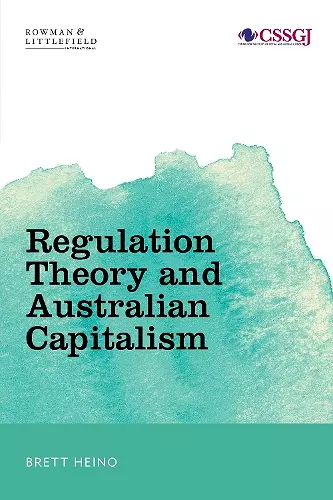Regulation Theory and Australian Capitalism
Rethinking Social Justice and Labour Law
Format:Hardback
Publisher:Rowman & Littlefield International
Published:22nd Nov '17
Currently unavailable, and unfortunately no date known when it will be back

The end of the post-World War II 'long boom' in the mid-1970s proved the beginning of a process of political-economic change that has fundamentally transformed labour law, both in Australia and across the developed world more generally. This is a phenomenon with deep ramifications for social justice. The dissolution of productive industry, the fragmentation of employment categories, the rise of profound employment precarity and an increasingly hostile legal environment for trade unionism have been of immense significance for key social justice issues, including income inequality, the rise of a new working-underclass, and the marginalization of organised labour. By combining the concepts of the Parisian Regulation Approach with an explicitly Marxist jurisprudence, this study offers a theoretically rigorous yet empirically sensitive account of legal transition, with key case studies in the metal, food processing and retail sectors. Given the similar development logic of post-World War II capitalism in Western societies, this theory, although operationalised in the Australian context, can be used in the effort to explain labour law change more broadly.
This book shows the crucial roles that the state and labour law play in reshaping contemporary capitalism. It casts light on the reasons for stagnant wages, the increasing precariousness of work, growing debt and vulnerability to financial crises. The author makes a strong case for looking at the causal processes through the lens of regulation theory. The focus is Australian, but the implications are global. This is a significant contribution to modern political economy. -- Frank Stillwell, Professor Emeritus in Political Economy, University of Sydney
The Regulation Approach to political economy has enjoyed a topsy-turvy career but Heino shows its full value in this penetrating study of post-World War II Australian capitalism, using it to demonstrate the centrality of labour law to the shift from Fordism to a “liberal-productivist” regime characterized by employment precarity and etiolated unions. A rewarding read and forceful set of claims. -- Brett Christophers, Assistant Professor in the Department of Social and Economic Geography and the Institute for Housing and Urban Research at the University of Uppsala, Sweden
At the cutting edge of debates on the role of law in the constitution and reproduction of capitalism, Brett Heino has administered a major hit of adrenalin to the Regulation Approach to resuscitate a focus on labour law, periodisation, and social justice. This book crucially helps us to understand the juridic form of capitalism and its concrete expression in conditions of class struggle. -- Adam David Morton, Professor of Political Economy, University of Sydney
This book innovatively interprets Marx's method, his long range analysis of capitalism, and mid-range Parisian regulation theory. These elements are then combined into an original conceptual framework that is deployed to analyse concrete forms of labour and labour law in Australia post WWII to the present. By integrating theory and concrete analysis in this way, Heino delivers no less than an exciting new approach to the study of industrial relations and labour law. -- David Neilson, Senior Lecturer, University of Waikato
In this book Brett Heino demonstrates scholarship of the highest quality. It is an exemplary piece of writing – among the best engagements with the Parisian Regulation Approach one is likely to find. Heino extends our understanding of the relationship between capitalism and the law and of the transformation from Fordism to liberal productivism. While focused on Australia, the book contains valuable insights into the forces that have re-shaped advanced capitalist economies more generally since the end of World War Two. -- Damien Cahill, Associate Professor of Political Economy at the University of Sydney
this book is, I think, one of the most sustained applications of the PRA to Australian political economy – or, more particularly, to Australian labour law. … Few labour lawyers, industrial relations academics or labour historians would contest Heino’s periodisation of the broad shifts in Australian labour market regulation. It’s a story we know by heart. Many of us, though, by nature work with a more detailed periodisation based around shifts in political administrations, and we tend to stop short of offering a structural explanation of the shifts we’re observing, beyond the broad clash of ideologies or political fashions. Heino’s approach is a useful corrective to this. * Labour History, No. 115 *
In summation, this book is highly theoretical and makes significant demands of the reader. Its endnotes and bibliography are impressively exhaustive, bolstering the authority and scholarship of the text. It is a book from which readers who variously engage with labour law could profit, especially those with critical perspectives, be they reformers or radicals. Heino’s achievement, using Australian examples, is to explain the ways in which labour laws come about, both as the products and as the shapers of specific stages of capitalism. Rather than being rooted in social justice interests or concerns, labour law regimes in capitalist systems are intricate parts and products of the system, driven by the class interests of the framers. Importantly, Heino argues that labour laws are variably contestable in their evolution, development and institution (and if they are not, they should be). His book has relevance wherever capitalism holds sway, and where rafts of labour law variously assist and enable the leviathan to keep afloat. * Law and History Review, Vol. 5, No. 2 *
ISBN: 9781786603555
Dimensions: 237mm x 159mm x 24mm
Weight: 558g
294 pages